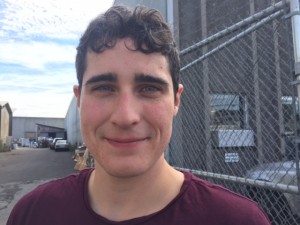Interviews like the one I recently conducted with 2015 Pride Foundation scholar, Ari Robbins, are important reminders to check my expectations at the door.
Knowing that Ari would be starting law school in a few short weeks at the University of Washington, I made plans to engage them in a conversation about advocacy law and their social activism.
Instead, when I asked, “What type of law will you go into?” I got an answer I didn’t expect.
“For the past three years, I’ve been managing a gay bar in Montreal while volunteering at an organization that served meals at a university,” Ari shared. “Honestly, I saw myself doing a lot more for my community while managing the gay bar than I did working as the volunteer coordinator for a community-based organization.”
Ari explained that their management role in a small, supportive business environment was their opportunity to cultivate a community space that provided people with a sense of belonging. It was an opportunity to directly impact the lives of others in a way that serving people meals couldn’t, such as intentionally hiring workers who had barriers to employment elsewhere because of transphobia or racism.
According to Ari, small business law is “100% public interest”—an idea that was illustrated as they discussed the myriad ways they’ll be able to advance equality by taking this approach. This ranged from breaking down barriers marginalized communities face when starting businesses, to converting traditional businesses into worker-owned co-ops that empower everyone involved.
The knowledge that business and hard work can advance equality did not, however, begin for Ari at the gay bar in Montreal.
“My Dad is from Montana and was a rancher, and he works so hard every day. His work ethic has also inspired me towards the same path.”
Ari’s Jewish upbringing also brought with it a history of intellectualism and a worker tradition that is focused on building community.
“The ‘mitzvah’, the giving back, the sense of community—this is how I feel connected to the Jewish faith. I think that the queer community and the Jewish community are natural companions—this idea that we’re always looking to build a community no matter where we go. That’s how I was raised, and that’s how I feel Jewish.”
When asked what it was like to grow up in the one-square-mile town of Brier, Washington as a Jewish person who identifies as trans*, Ari remembers being bullied.
“Looking back, I can’t tell if I faced bullying because I was Jewish or because I was queer. Anti-Semitism is definitely an issue there, so it’s hard to tell. Either way, the world knew I was queer from a very young age.”
Though Ari’s parents have been supportive throughout their transition, they explain that it has still been difficult.
Ari explained, “I’m happy to be at a place where I have the energy to be compassionate with my parents as they’re trying to catch up. I don’t think that them needing time makes them bigots or at all transphobic.”
Ari reflected that, for the most part, the Jewish community is supportive of LGB folks, with the vast majority supporting same-sex marriage.
“With trans* folks, though, it’s a different story. Like virtually any other religion and society more broadly, the patriarchal structure of Judaism means that any challenge to masculinity—which is how being transgender is seen, regardless of whether the transition is male to female or female to male—is seen as threatening and will generally be resisted.”
Ari explained that their move to Montreal allowed them to fully embrace their gender identity. Québec is the only Canadian province to offer comprehensive healthcare for transgender people at no cost, including hormonal and transition-related care. Because of this, Ari felt at home with the city’s ever-growing trans* community.
“For the first time, I felt comfortable noticing myself,” Ari reflected.
Ari also joined the board for a Chavurah in Montreal—a group of Jewish people that come together to celebrate their Jewish faith, yet resist the hierarchical structure and traditional restrictions of Judaism.
For Ari, this community allowed them to find reprieve and comfort in an alternative religious practice that celebrated differences and met Jewish people exactly where they were at. While there, Ari organized community meetings that not only facilitated growth and support within the community, but also promoted dialogue on topics such as the Israeli/Palestinian conflict and the intersection between the Jewish community and the LGBTQ community.
Ari is most excited about continuing these challenging conversations—or “bumping into people,” as they put it—in less than a month when they walk into their first class at UW School of Law.
Though they are nervous, Ari explains, “I took a longer and more roundabout path to get here than many of my peers, and I feel good about that. Knowing that I didn’t make the decision hastily makes me less nervous.”
No matter their path forward, Pride Foundation is proud to support Ari as they continue bumping into people in the future—continuing to challenge assumptions and making people check their expectations at the door.
Skyler White-Culton is Pride Foundation’s Communications & Community Engagement Intern.
Katelen is Pride Foundation’s Community Engagement Manager. Email Katelen.
Read the rest of the articles in the October eNews:
